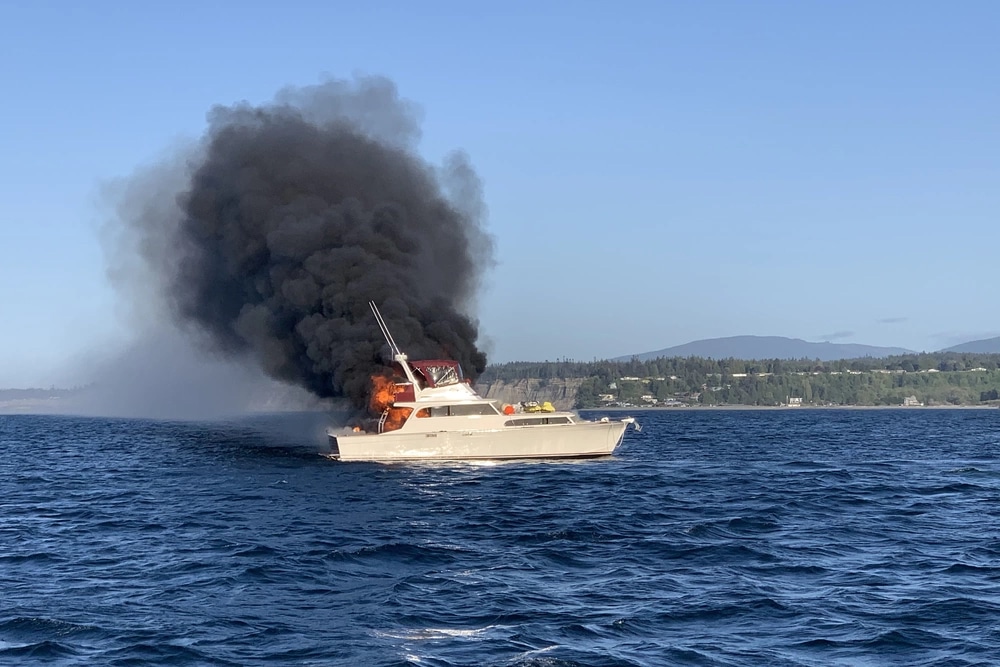
When heading out to sea, there is one saying that should be top of mind for any captain of a vessel: “An ounce of prevention is worth a pound of cure.”
Simply put, it is better and easier to stop a problem from happening than to correct it after it has started. I know, because I have been there and done that. In several instances checking a simple fitting to make sure that it was secure would have prevented what was luckily only misadventure, not tragedy.
Fire on Fishing Boats
A recent fire on a large commercial fishing catcher-processor, the Kodiak Enterprise, brought a whole host of issues to mind. As luck would have it, this vessel was tied to the dock when a fire broke out that burned for several days. Another commercial fishing vessel owned by the same company also burned for days at the same dock. Makes one wonder? There are any number of things that could go wrong, but the recent fire has yet to have the cause determined.
Should the average boater be concerned about a fire onboard? Well, as for the concern, yes. Boaters and anglers should be aware of the possibility. However, by being aware, the concern should be minimized.
Causes of Fishing Boat Fires
There are a number of reasons for fishing boat fires. About 35 percent of boat fires are caused by direct current, or DC, electrical issues. These would be issues with the boat’s charging and house electrical system, with chafed wiring being the biggest problem. In most cases that is the start and it goes downhill from there.
On bigger boats, the alternating current, or AC, electrical system is a big cause of fire. This often relates to vessels being plugged into shore power and the circuits getting overloaded. Electrical fires can get started quietly and this gives them time to become harder to control once they are discovered.
On boats with inboard engines, the cooling system can be the source of fire trouble. Once an engine compartment becomes overheated there are a number of potential problems. Also, boats currently run on combustible fuels. In any enclosed area, the fuel and the fumes from leaking tanks or lines become lethal with any kind of ignition, either spark or heat.
One of the easiest causes of fire to avoid is spontaneous combustion. Often this happens when a boat is in the boatyard and under repair. Oily rags get piled in a corner and within a short period they ignite. These fires quite often take out multiple boats which are stored close together.
Avoiding Fire on Fishing Boats
Can all boat fires be avoided? Likely not, but the risk can be minimized. Visual inspection of wiring that passes through bulkheads to make sure it is bundled and properly wrapped for protection can help eliminate electrical issues. So can making sure that wiring has not come loose and is resting against a hot or moving surface. Ensuring bilge blowers are working helps get rid of potentially dangerous fuel fumes. A metal container that seals fairly well is a reasonable place to put oily rags and adding some water won’t hurt.
What to Do if a Fishing Boat Catches Fire
If a fire breaks out while at sea, what should your first reaction be? Simple answer: Get on PFDs. Many bigger boats with inboards are equipped with fire suppression systems for the engine compartment. These are often automatically activated and hearing them go off may be your first indication of a problem.
In the event of a fire, make sure that you notify whatever sources of help you can. If there are any other boats in the area, they are required to come to your aid. For outboard-equipped boats, the fire extinguisher(s) that you check every spring or that the Coast Guard Auxiliary inspects for you will be true lifesavers.
It is hard not to, but don’t panic. Know what you need to do and do it methodically. If you have expended all your fire suppression equipment and the fire is not extinguished, you may have to abandon ship. Certainly, if the fire begins to surround the fuel tank(s), it is time to get away.
Environmental Issues Caused by Boat Fires
I don’t like to be negative, but the fire may just be the beginning of your problems. There are some liability issues as well, so make sure that your insurance policy has some coverage for this.
In relative terms, these issues will depend on the size of the boat. If the boat sinks in a harbor and the fuel escapes the tank(s), the boat’s owner will be liable for the clean-up costs. In some areas there could also be fines added.
Obviously, the bigger the boat and the tanks, the larger the potential problem. If the fire happens at the dock or in a crowded harbor, the boat owner will be liable for damage to other boats. So, coverage is important.
Now for some better news: Fires and explosions affect a relatively small percentage of boats on the water. Today’s boat builders have done a great job minimizing potential problems and building in systems that can handle most situations. That does not mean you can ignore the possibility. Always remember the Boy Scout motto, “Be Prepared.”









